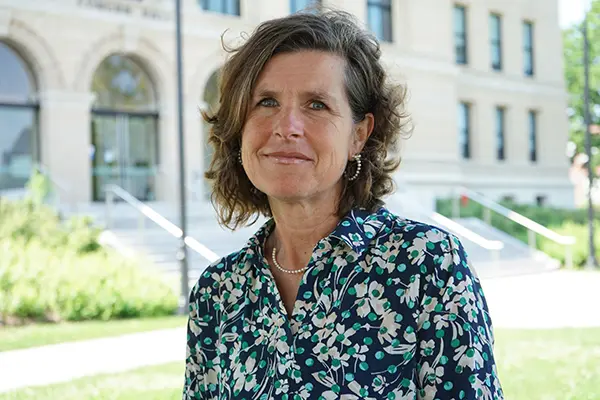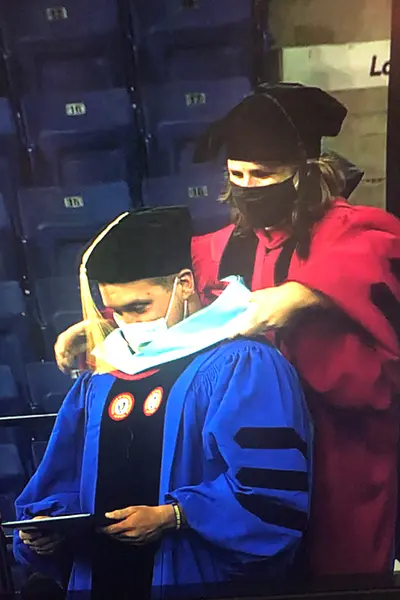Stacy Szczesiul is Praised for Commitment to Students
 Image by K. Webster
Image by K. Webster
07/08/2021
By Katharine Webster
As a high school student in the 1980s, Assoc. Prof. Stacy Szczesiul wanted to make a difference – and be taken seriously. She majored in political science at the University of South Carolina and planned to go to law school.
“Coming up as a young woman in the South, I wanted to do something that had status in the eyes of society,” she says.
Just in case she didn’t like law, she had a backup plan: earning a teaching license. The backup plan won out – and so did UMass Lowell.
Szczesiul, who directs the Doctor of Education (Ed.D.) program, won the 2021 Manning Prize for Excellence in Teaching and Service, which is awarded annually to one professor at each of the five UMass campuses. The award was established in 2016 by alumni Robert ’84, ’11 (H) and Donna Manning ’85, ’91, ’11 (H).
Szczesiul was nominated by Education Chair James Nehring, a previous Manning Prize winner, in recognition of her work on the Ed.D. program, which has doubled in size under her leadership and is highly regarded nationally. Nehring also praised her academic and emotional support for her students, as well as her commitment to social justice in education.
“Stacy is a tireless advocate for her students, and she brings together the two crucial qualities that make an excellent teacher,” Nehring says. “First, she sets high educational standards. And then she provides the instructional, emotional and structural support to get students to achieve those high standards. I don’t know anyone else who does that quite as well as she does.”
Szczesiul says that she is one among many accomplished educators in her college who could have won the award. She credits the success of the Ed.D. to collaboration with dedicated colleagues, particularly Assoc. Prof. Phitsamay Uy, who worked closely with her to design and grow the program, which is part of the Carnegie Project on the Education Doctorate.
Szczesiul’s former students say she is highly deserving – and that her support was crucial in helping them finish their doctorates, which most students complete while working full time as school principals, curriculum specialists or superintendents.
 Image by Courtesy John Braga
Image by Courtesy John Braga
“She knew this project was so personal to me, and she was so very gentle, even when I wasn’t as nice as I could have been when she was giving me feedback, and she guided me right through it,” he says. “She’s supportive to everyone.”
Catherine O’Connell ’18, principal of North Reading Middle School, says Szczesiul helped her structure her research into how a school’s disciplinary practices affect its social-emotional climate and student learning.
“She was able to mitigate any stress or anxiety I had about this looming, huge project,” O’Connell says. “She was always reassuring, and instead of creating obstacles, she helped me overcome any obstacles.”
Szczesiul worked at a law firm for a year after college before deciding to pursue graduate studies in special education at the University of South Carolina. She also met and married Anthony Szczesiul, now an English professor at UMass Lowell.
When he got his first job in the City University of New York system, she found a job in the Crown Heights section of Brooklyn, New York, working with high school students with emotional disabilities who had been kicked out of their regular public schools.
Szczesiul says the job showed her the degree to which schools were failing to respond to children with psychiatric diagnoses and to those who were racially, culturally or linguistically diverse. Instead, the schools largely treated troubled kids with disciplinary measures.
“The kids who are often disciplined, most of them are acting out” due to emotional problems caused or aggravated by homelessness, food insecurity, and lack of access to quality healthcare and other resources most people take for granted, she says. “There wasn’t enough effort on the part of schools to ask why kids were acting out, why kids were dropping out.”
After two years in New York, the Szczesiuls moved to Texas, where they both taught for a year before Anthony got hired by UMass Lowell. Stacy then found a job at Souhegan High School – an “essential school” recognized for excellence – in Amherst, New Hampshire, a predominantly white, wealthy town. While there, she found herself thinking about what makes a school a good workplace for teachers – and what doesn’t.
That became the focus of her research after Harvard University accepted her into its doctoral program, which she completed while working full time and co-parenting two, then three, children. In her dissertation research, she found that mid-career teachers in urban districts were more likely to stay in the profession if their schools fostered an environment of collaboration and continuous improvement.
“I wanted to have an influence on how schools are organized and led, particularly as places where teachers come to work and to learn,” she says.
She has done that in her 12 years at UMass Lowell, where she and Nehring did research with one of her Harvard classmates, Megin Charner-Laird, into the characteristics of high-performing teachers and schools. That resulted in a book: “Bridging the Progressive-Traditional Divide in Education Reform.”
Szczesiul and Charner-Laird, who teaches at Salem State University, are now researching Massachusetts’ “innovation schools” – charter-like schools within public districts – to see how they compare to traditional public schools. The state is sharing its data, and the pair plan to expand their study to include innovation schools in other states.
“We’re asking what innovations these schools are adopting, and we’re asking in what ways the innovations might mitigate the inequities that exist in Massachusetts and U.S. schools,” Szczesiul says. “Right now, we can’t say anything about their efficacy and whether students do better in them.”




